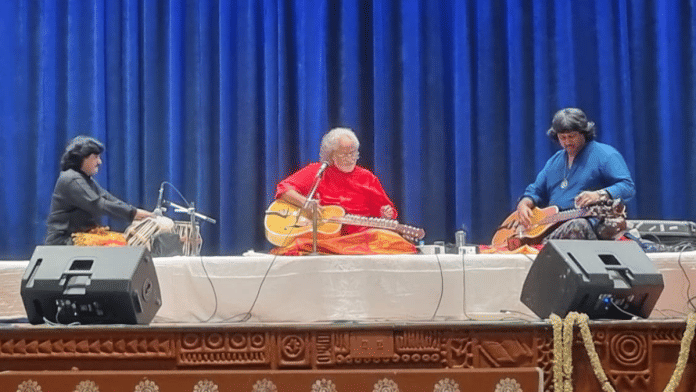Hisar: The packed hall waited with bated breath as the musicians drifted onstage, tuning strings, testing mics, tapping out loose ‘bols’ (syllables) on the tabla. A single rhythm check snapped the evening into place. As the lights settled, Pandit Vishwa Mohan Bhatt began his dazzling musical display for nearly an hour.
A Padma Bhushan, Grammy winner, and innovator of Mohan Veena, Pandit Bhatt is an artiste whose presence arrives before his music does. Much has been said about the milestones, the global stages, the honours, the UN performance in Geneva, but none of that were in the mind of those sitting inside the auditorium. All they waited for was the master in his flow.
At the inaugural Jindal Literature Festival on Saturday evening, he was accompanied by his son Salil Bhatt on Mohan Veena and Pandit Himanshu Mahant from Banaras Gharana on tabla.
The recital opened with a gentle Ganesh ‘mantra’ (chanted at the beginning of a new project or undertaking to ensure success) sung softly by Pandit Bhatt—‘Vakratuṇḍa mahākāya sūryakoṭi samaprabha, nirvighnaṃ kuru me deva sarvakāryeṣu sarvadā.’
At his urging, the audience joined in, their voices rising hesitant at first and then gathering into a warm, collective murmur that filled the hall.
Panditji began with the Raag Bhupali, as the melody calmed the audience, a mic buzz interrupted only briefly by a passing disturbance. He smiled, and the children sitting on the floor of the auditorium reciprocated. Soon, everyone slipped into the raga again as though nothing ever jolted them.
The first segment begins with an Assamese melody honouring Bharat Ratna Bhupendra Hazarika. But it was the unexpected Gujarati-tinged passage that truly stunned the audience. For a moment, it felt like two rivers meeting to form a shared current.
Then the evening deepened into Raag Desh, with the Rajasthani folk tune ‘Balamji Mahro Jhilmil Barse.’ The sound turned the atmosphere from monsoon to bright desert. Subsequently, a gentle ‘jugalbandi’ (duet) unfolded between Panditji and his son, their strings echoing each other like mirages meeting on the dunes.
The final piece was the rendition of Raag Jog, which is typically performed in the late evening or night. Pandit Bhatt brought in the piece that changed the course of his career—’Meeting by the River’, the work that won him the Grammy in 1994 and introduced the world to what many call the Ganges Delta Blues. For an instant, the hall felt suspended at the crossroads where Indian classical music meets the world.
As the performance came to an end, the hall erupted into two minutes of applause. Just as the audience began to settle, Bhatt looked up with a quiet, almost playful surprise in his eyes. He gestured for everyone to remain standing. A hush fell. And then, with the same grace that marked the evening, he lifted his slide and began to play the national anthem, an unexpected, stirring finale that left the room absolutely patriotic.
Finally, the performance ended with a soft glide, a gentle ‘tihai’ (concluding part of a musical phrasing), and a small nod. “You all sing better than me,” he jokingly said. The hall dissolved into laughter.
ThePrint is the official media partner for the Jindal Literature Festival.
(Edited by Tony Rai)






